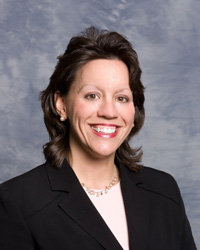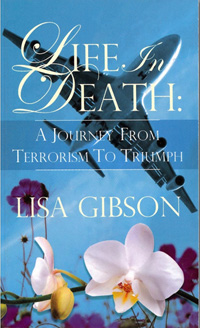
DAVID ADAMS reports…
When Lisa Gibson heard that her 20-year-old brother Ken was among the 270 people who died when Pan Am flight 103 exploded over Lockerbie, Scotland, on 21st December, 1988, she found her view of God shaken in a way she’d never imagined.
A freshman in college, the 18-year-old had just finished first term as a freshman in college and was looking forward to seeing her brother who, stationed with the US Army in Berlin, Germany, was coming home to spend Christmas with his family in the US state of Michigan after two years away.

Lisa Gibson
“(G)od challenged me that I needed to write him a letter letting him know I forgave him. In the letter, I introduced myself and told him that my brother had been killed on Pan Am 103. I said ‘only God knows if you are really responsible, but as a Christian, I need to forgive you’.”
– Lisa Gibson on a letter she wrote to convicted bomber Abdelbaset al-Megrahi.
Then came news of the explosion which tore the plane apart, killing all those on board and 11 people on the ground.
“As a Christian, I was instantly struck with how was I to respond,” Ms Gibson recalls. ”This tragedy definitely shook my view of God. Like many Christians, I had grown up with a bit of a ‘half Gospel’, believing bad things weren’t supposed to happen to Christians…”
Ms Gibson says the one thing she knew early on was that the Bible called her forgive. But forgive whom? It was years before Libyan Abdelbaset al-Megrahi – the only man ever convicted of the bombing – faced court and was eventually, in 2001, convicted of involvement in the bombing and sentenced to life imprisonment.
So Ms Gibson set out to try and understand why someone would want to blow up a plane full of innocent people.
“I even did my senior thesis on Islamic terrorism,” she recalls, but adds that ”in the end, it only left me with more questions”.
While she recalls God speaking to her heart, telling her that in this fallen world, the “only answer” is Jesus Christ, Ms Gibson says she wasn’t ready to hear it then.
“I was content with being simply indifferent. I didn’t know any Muslim people, and that was the way I wanted to keep it. Several years later, God began to challenge me with what His Word says. It doesn’t say don’t hate your enemies. It says to love your enemies. So, I was challenged: ‘How do I go about loving people who live on the other side of the world?’”
Her decision ultimately led her to write to Megrahi.
“(G)od challenged me that I needed to write him a letter letting him know I forgave him,” she says. ”In the letter, I introduced myself and told him that my brother had been killed on Pan Am 103. I said ‘only God knows if you are really responsible, but as a Christian, I need to forgive you’.”
Megrahi wrote back, saying he was sorry for her loss but denying responsibility for the bombing.
Ms Gibson, who has visited the Scottish community of Lockerbie twice since first going there six years ago, says she believes it is only through the power of God’s spirit working inside her that she has been truly able to forgive Megrahi, to “turn around and love my enemies”.
“But I believe we are called to forgive and love our enemies, because it is a powerful witness, especially to the person who hurt us. It is the essence of the Gospel. It is like Jesus hanging on the cross, and looking down at the very person responsible for his death and saying ‘Father, forgive them for they know not what they do’.”
It’s the power of that forgiveness which years later led her to visit Libya and, following that, to found the Peace & Prosperity Alliance – a non-profit organisation dedicated to creating cross-cultural partnerships between government, business, civic and religious leaders in the developed and developing world in a bid to create lasting change.
“The heart of this organisation is about overcoming evil with good,” Ms Gibson says. “The focus is on addressing social evils such as terrorism, oppression, and injustice.”
With the cooperation of the Libyan Government, the organisation now works in a range of humanitarian and educational initiatives – including projects aimed at helping Libyan children with HIV/AIDS and English language teacher training – to help build “bridges of reconciliation” between the US and Libya.
Speaking to Sight via email earlier this week, Ms Gibson, who lives in Colorado Springs in the US, says she understands the anger people have expressed at the Scottish Government’s decision last month to release Megrahi on compassionate grounds following revelations that he was suffering from terminal prostate cancer and only had months to live.
“I very much understand why people are angry,” she says. ”He only served a fraction of his sentence. It is by no means just. But as the Bible says, mercy triumphs over justice. That is what we are seeing here. He was released on compassionate grounds. It in know way effects the fact that he was convicted – Libya accepted responsibility, and paid civil damages. As far as the world is concerned, this guy is responsible. This decision doesn’t change that.”
Noting that leaving him in prison would in no way bring lost family members back, Ms Gibson – who had previously told a US TV station that while she initially had concerns with his release, she had decided on hearing of his prostate cancer that releasing Megrahi was the “humane thing to do” – says that allowing his release on compassionate grounds is about taking the more honorable road.
“It truly is an act of walking in the opposite spirit. Rather than responding in hate, like the terrorists do, we are attempting to respond in love. It truly is an act of lumping coals of shame on their heads…”
Ms Gibson, who has previously tried unsuccessfully to visit Megrahi in prison, says she will visit him the next time she is in Libya, if he allows her to (and is still alive). She says she knows countless Muslims who have come to a Christian faith after reading Romans 12:21 – “Do not be overcome by evil, but overcome evil with good” – and seeing it in practice.
“It is so counter to their world view, but that is why there is power in it,” she says. “I have transferred this wrong into heaven’s courtroom to be litigated by father God, trusting that He will right the wrong and bring justice. But in this life, I believe God calls us to take our hurts and pains and use them to be a conduit of redemption in the lives of others, even those very people that are responsible for our loss. I asked if I could come to visit (Megrahi), so that I could pray for him. If he allows me to come and he is still on this earth next time I am in Libya, I will go.”

STORY OF A JOURNEY: Ms Gibson’s book ‘Life in Death: A Journey From Terrorism to Triumph’ has just won first place in the Winter 2009 Christian Choice Book Awards.
Ms Gibson first visited Libya in 2005 when she became the first member of an American family whose relative was killed in the Lockerbie bombing to do so. The previous year, she had written to the Libyan ambassador to the US and, after telling him her story, said that, as a Christian, she needed to forgive and wanted to go to Libya so she “could begin to see the people differently than I had seen them for the previous 17 years”.
He agreed to help and so she accompanied a tour group the following year, staying on an extra three days so she would meet as many government officials and individuals as she could to tell them her story and that, as a Christian, she had come to meet them so she could forgive them and learn to love them.
“It was the most moving experience of my life, because as I would tell my story even grown men would begin to weep,” she says. “For the first time I understood, why we are called to love our enemies. It is because there is power that breaks down all kinds of barriers and allows transparent, heartfelt communication to flow. Then I realised that my going there was more about them than it was about me. I found myself asking all kind of questions about them and their lives. I found out that they are very much an oppressed people that has suffered much. I came back determined to do what I could to help them.”
As well as running the PPA, Ms Gibson has written a book about her journey – Life in Death: A Journey From Terrorism to Triumph – which she says she wrote in part for Christians who are struggling with how to respond to the war on terrorism from a Biblical perspective; to explain how the battle is truly a spiritual one.
Ms Gibson describes forgiveness as an important principal in the Kingdom of God and notes that it isn’t about “stuffing the pain (down) or trying to act like it doesn’t exist” but about transferring it up to “heaven’s courtroom” and allowing God to right the wrong.
“I think continuing to hold on to it hurts and pain is an incredibly disabling process for us both physically, emotionally and spiritually,” she says. ”If we continue to remain in unforgiveness, it becomes a stronghold of bitterness.”
But she adds that there is a “big difference” between forgiving someone and reconciling.
“Sometimes, we cannot reconcile because the person is going to continue to hurt us,” she says. “In those situations, we can release it to heaven’s courtroom and then boundary any involvement with that person, if it will continue to bring us harm. My heart for people struggling with this is to validate what they have experienced…I never respond in pat answers or easy solutions. People have to fully feel the pain before they can walk through to freedom. Otherwise it becomes a wound that just continues to fester but never heals.
“In those situations, it is like they are litigating the case in the inner courtroom of the heart, over and over and over. But can never find relief. What I say to them is get help, allow someone to help you to walk through the pain and the process of transferring the wrongs done against them up to heaven’s courtroom and trust that Father God, who has made (Jesus) the Judge, the Jury and the Attorney, will surely right the wrong and bring them justice.”
Ms Gibson says the biggest lesson God has taught her out of what has happened is that He will use even the most horrific of acts for His redemptive purposes if we let Him.
“I remember the day where God gave me the choice. He asked me the question, ‘How will you allow me to be glorified in this tragedy?’ That is the heart of my mission. The other thing He has taught me is that mercy and justice are not mutually exclusive ideas. Just as God is both just and merciful, He asks us to respond in the same way.”
~ www.peaceandprosperityalliance.org





